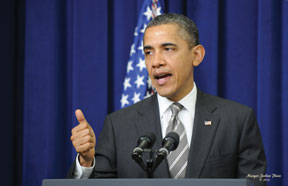

Obama places new emphasis on education
By Jazelle Hunt National Correspondent
WASHINGTON, D.C. (NNPA) – The New Year has ushered in a renewed focus on education reform in the Obama administration.
This month’s flurry of activity began with the announcement of the first five “Promise Zones,” an initiative designed to help local communities expand educational opportunities, among other things. The following week, First Lady Michelle Obama and President Barack Obama hosted a series of education conferences at the White House, most notably the Education “Datapalooza” for STEM educators and innovators, and the Expanding Educational Opportunity summit for higher education stakeholders.
And the action continues with the creation of the President’s Advisory Commission on Educational Excellence for African Americans. The commission is actually part of Executive Order 13621, which established the White House Initiative on Educational Excellence for African Americans in 2012. This advisory arm has only existed as part of that document until now, as Obama has appointed the initial commissioners.
The White House Initiative on Educational Excellence for African Americans seeks to improve educational outcomes for all African Americans by ensuring they receive an education that prepares them for college, productive careers, and satisfying lives. Its corresponding advisory commission is charged with overseeing this goal by collecting data and advising the president and the Department of Education on relevant actions and policies occurring throughout the federal government.
As detailed in its executive order, the advisory commission has eight specific objectives, including collecting data on educational challenges and their causes; increasing early childhood education and improving these programs; decreasing disproportionate referrals to special education; and reducing the dropout rate while improving access to college and career training.
The initiative and its commission are the newest addition to a corps of initiative-commissions housed in the Department of Education that seek to reestablish the United States as the global leader in educating its citizens. Currently, the Department of Education supports the White House Initiative on Asian Americans and Pacific Islanders; the White House Initiative on Educational Excellence for Hispanics; the President’s Board of Advisors on Tribal Colleges and Universities; the President’s Board of Advisors on Historically Black Colleges and Universities; and the Center for Faith Based and Neighborhood Partnerships.
One of the oldest of these is the initiative on Educational Excellence for Hispanics. Nearing its 25th year, the commission has learned the ins and outs of wielding its advisory role. Executive Director Alejandra Ceja’s tips for the incoming commission include the importance of basing decisions on data, the necessity of building relationships with and between local agents who serve your community, and the honor of being able to connect that community to vital resources.
“I really think [an advisory commission] is a great way to elevate your issues nationally, using the commissioners and the expertise hey bring from being in the trenches,” she says. “Be clear about your executive order and how you can provide for your community … and ensure that we close that opportunity gap.”
Although all of these initiatives exist to further the goal of effective, comprehensive education for all Americans, each has its distinct tasks and methods. This new commission, for example, is uniquely linked to the President’s Board of Advisors on HBCUs. (The HBCU advisory board itself stands apart from the other Department of Education initiatives. For starters, it is the oldest; President Jimmy Carter issued the executive order for the initiative’s predecessor in 1980. But HBCUs have maintained a delicate relationship with the federal government since the Civil War and Reconstruction eras).
The Initiative on African American Educational Excellence is designed to complement and support the President’s HBCU advisory board. In fact, to ensure this collaboration, the initiative’s executive order mandates that two members of its commission will also serve on the HBCU advisory board, and vice versa.
The executive order allows for 25 members. So far, Obama has appointed 15 highly-accomplished professionals from varying areas of expertise to the advisory commission: Angela Glover Blackwell, Barbara T. Bowman, Gwendolyn E. Boyd, Walter G. Bumphus, James P. Comer, Al Dotson, Jr., Akosua Barthwell Evans, Jim Freeman, Sharon J. Lettman-Hicks, Michael L. Lomax, Bryant T. Marks, Robert K. Ross, Doris A. Smith-Ribner, Ronald A. Williams, and TyKiah R. Wright. A few more appointees are expected to be announced in the coming weeks. The commission has not yet convened.
“These fine public servants bring both a depth of experience and tremendous dedication to their new roles,” Obama said in a statement. “Our nation will be well-served by these men and women, and I look forward to working with them in the months and years to come.”


Be the first to comment